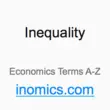-
- Scuole Estive
- Posted 1 day ago
BSE Summer School 2026: Economics, Finance, Data Science, and related fields
Starts 22 Jun at Barcelona School of Economics in Barcelona, Spagna
-
- Seminario
- Posted 1 month ago
3rd Development Economics Workshop (DEW 2026) – Durham University Business School
Between 9 Jun and 10 Jun in Durham, Regno Unito
-
- Postdoc Job
- Posted 3 months ago
2 Stephan Klasen Fellowships for postdoctoral researchers in development economics
At University of Göttingen in Göttingen, Germania -
- Conferenza
- (Hybrid)
- Posted 4 months ago
Call for Papers - In_equality Conference 2026
Between 15 Apr and 17 Apr in Konstanz, Germania
-
- Econ News
- Posted 5 months ago
South Africa Appoints Economic Experts for G20 Report on Wealth Inequality
South Africa has appointed a panel of distinguished economists to address the pressing issue of global wealth inequality as part of its G20 Presidency. The initiative aims to provide comprehensive solutions to counteract the widening wealth gap exacerbated by recent economic shocks.
-
- Pensiero politico
- Posted 4 years ago
Una critica al Centrismo
The current moment is one defined by crisis. It can be found everywhere: in the climate, economy, mental health, even in democracy. It’s so ubiquitous as to have almost become the new norm. Amid the chaos, politics has struggled to keep up, its landscape is in permanent shift, its rulebook long thrown away. New formations have emerged, metastasized, sometimes died, and occasionally taken over - developments often surprising and hard to make sense of. What’s clear, though, is that polarisation has set in. From Bernie to Bolsanaro, from Modi to Make America Great Again, the voices now heard, the names that fill newspaper columns, are reminding us just how wide the political spectrum is. For many, it's a terrifying prospect, for others, it’s a thrilling and necessary reset. For the centre, as developments in the US and UK are showing, it may well spell death.
en it es fr
-
- INOMICS Salary Report 2020
- Posted 5 years ago
How COVID-19 has Affected Economists in the Global North and South
The damage wrought by COVID, far from equalising, has been pointedly prejudiced. While the virus itself may struggle to differentiate between people, the world in which it operates has no such problem. Indeed, its structures have ensured COVID’s disruption of employment has fallen unevenly across regions - the experience of economists a case in point. Data from the forthcoming INOMICS’ Salary Report speaks to this directly, revealing the relationship between where one works - specifically in which country - and the level of vocational dislocation.

-
- We Stand Divided
- Posted 5 years ago
The Effects of Inequality on Society
Inequality is rampant, we hardly need telling. Rarely does the print media pass up an opportunity to remind us. We stand inundated by an endless stream of statistics – on scales barely fathomable – each one more depressing than the last. For instance, it’s widely known that: ‘8% of humanity takes home 50% of global income’; that ‘the top 1% own 45% of the world’s wealth’; and how could we forget that ‘the 26 richest people on earth had the same net worth as the poorest half’. As shocking as these stats once were, they’re now dishearteningly familiar; we can recite them unassisted; we are numb to them.

-
- Economics Terms A-Z
- Posted 5 years ago
La disuguaglianza
en it es de fr
-
- Corso supplementare
- (Online)
- Posted 5 years ago
Inequality and Labour Markets
at University of Oxford in Regno Unito
-
- Inequality in Society
- Posted 5 years ago
The Case for Wealth Taxation
The emergence of Joe Biden as the unassailable front-runner in the Democratic Primary belies a contest that at various turns broke new ground. From its unprecedented field, larger and more representative than ever (save the brief participation of two billionaires), to the remarkable resuscitation of one moribund campaign, the departure from custom was clear. Nowhere was this more obvious than in policy, where the inclusion of senators, Elizabeth Warren and Bernie Sanders, dragged the conversation leftwards into distinctly uncharted territory. While all candidates acknowledged America’s extreme inequality and the need for better healthcare, social security, etc., divergence came in the prescribed means of redistribution, and unusually discussion extended beyond familiar calls to raise income tax for the rich. Most liberal of the proposals was a wealth tax: an annual tax on everything an individual owns. Its mere suggestion confirmed an improbable rise of a policy that until recently was dismissed as fringe and anti-aspirational.

-
- Gender Inequality
- Posted 6 years ago
Government intervention helps women. We need more of it
The jostling between market and state, and the territory that each occupies, lies at the heart of political discourse. It's the major fault line around which political parties form and debates rage. Despite their uneasy relationship, between them they generally make available all that we need, be it food, a home, healthcare, employment, or education, at varying - and often questionable - quality and cost. The demarcation between the two, rarely ever static, differs widely across states, and speaks to the values of the society in question. What, for instance, can be said of a country whose privatised higher education is financially off limits to its poorer citizens? Is it right to leave the market responsible for people’s health? And what of the provision of childcare?

-
- Are They Really Worth It?
- Posted 6 years ago
Executive Compensation in the US
Rising year on year, seemingly irrespective of company performance, US executive pay is eye-watering. For decades now, its increase - the small blip following the financial crisis aside - has been rapid. As their wallets have bulged, however, CEOs’ standing in the public eye, has fallen precipitously - plotted on a graph the relationship between the two would make a big X. And this is a significant shift. It wasn't long ago that the American entrepreneur was heralded as an almost mythical figure: the embodiment of all that was good about the country; the opportunity it afforded; the work ethic it rewarded; the fact that with the right attitude anything was possible. They were the American Dream in action; evidence that it could be made real.

-
- Blog Post
- Posted 6 years ago
Does Economics Have a Problem with Women?
Economics has a gender problem, it always has, and unfortunately, it appears to be getting worse. Until recently, the impression was that this historically male-dominated discipline was turning a corner—albeit rather slowly—and the number of women studying economics was creeping upwards. That progress, however, looks to have stalled, and by some accounts, including that of the Australian Department of Education, actually gone into reverse. All the while, the number of women in the STEM fields (Science, Technology, Engineering, and Maths)—long notorious for their poor gender ratios—has been steadily increasing. It looks as though the ‘old boys’ club’ of economics might be closing ranks.

-
- Blog Post
- Posted 12 years ago
What is Inequality? Links and Resources
There exist two sides to every argument; in this one we have on one side a utopian world where everyone is equal and on the other a world where inhabitants don’t want to share what they’ve earned (presumably) by persistence and hard work with others and keep it for themselves. Herein lie the issues of inequality and the question of welfare and income redistribution. There are debates at every level of society, government and especially amongst economists as to where this problem comes from and how to tackle it.





















